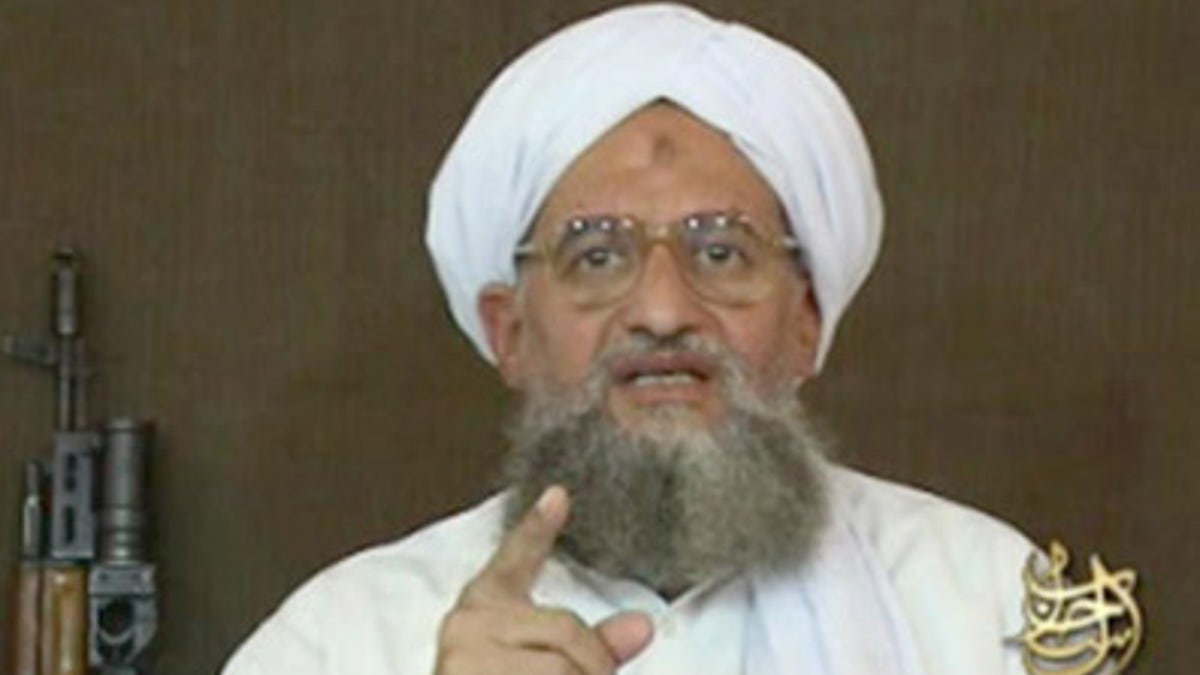
A video still of Ayman al-Zawahiri, the current leader of Al Qaeda. (AP/IntelCenter)
Fox News has obtained a draft copy of a new Government Accountability Office (GAO) report that concludes, a decade after 9/11, gaping holes remain in databases of overseas terrorists as well as in passport security.
"The system truly is as strong only as its weakest link,” Maine Sen. Susan Collins, the senior Republican on the Senate Homeland Security Committee, told Fox News after reviewing the report.
“We have spent literally billions of dollars to increase security, to make sure our watch lists are more complete, to verify documents, but in fact we have to rely to a certain extent on the systems used by other countries.”
According to a year-long investigation by the GAO that included travel to Kenya, Pakistan, the Philippines and Thailand, many countries have yet to address the chronic problem of fake documents, such as birth certificates, which are a gateway to a genuine passport. Passport security is described as weak with many countries using no security features, such as biometrics, to prevent fraud.
The GAO report, first obtained by Fox News, reads in part:
“Some countries do not have their own database systems with terrorist screening information or access to other countries’ terrorist screening information to keep track of biographical and biometric information about individuals who are known or suspected terrorists. Even when countries have terrorist screening information, they may not have reciprocal relationships to share such information or other travel-related information such as airline passenger lists, with other countries, thereby limiting their ability to identify and prevent travel of known or suspected terrorists.”
The GAO report also notes widespread corruption means a wink and a nod at some foreign airports will get a suspected terrorist through security.
Pakistan was problematic for investigators. Even with Usama bin Laden's death at his compound near the capital Islamabad, the country remains the base for Al Qaeda's core leadership, including Ayman al-Zawahiri, the Egyptian doctor who replaced the Al Qaeda leader. Yet, Pakistan's ability to track known and suspected terrorists is substandard.
”It is stunning, that Pakistan which is supposed to be our ally in the war against terrorism, does not even share fingerprint data within its own government,” Collins told Fox News. “It doesn’t share it with other Pakistani law enforcement agencies. That’s a real problem.”
While information sharing and passport security has improved in the U.S., the disparity overseas remains a serious problem.
"Fraudulent travel documents are the same as weapons to terrorists; they can't carry out their plots without them,” Chad Sweet, co-founder of the Chertoff Group, told Fox News.
Sweet, who is a former chief of staff for the Homeland Security Department and once worked for the CIA’s Directorate of Operations, says progress is being made overseas, but it has not kept pace with improvements to domestic security.
“On the defensive homeland game, we're probably at an A. If I give us a grade abroad, with our partners, again some of that is out of our control, we are probably closer to a C.”
The GAO report will be officially released on Wednesday when the issue is taken up publicly by the Senate Homeland Security Committee. Sen. Joe Lieberman, who chairs the committee, called for an updated approach.
“As part of our efforts to keep terrorists from entering the United States, we provide security assistance to foreign countries where terrorists are likely to begin their travels. Unfortunately, GAO has found miscommunication and overlap on the part of U.S. agencies trying to help our foreign partners," he said. "I urge the administration to update what is now a five-year-old strategy for preventing terrorist travel so that we can work as effectively as possible to keep terrorists out of the country and away from innocent Americans.”
Collins told Fox that the issue has taken on more importance because the threat from Al Qaeda’s affiliates in Somalia and Yemen is growing.
The Yemeni affiliate, which includes the American Cleric Anwar al-Awlaki among its leadership, was behind the last two major attempts on the U.S. using airplanes. It was also behind the recent threat intelligence that the group was trying to recruit a surgeon to surgically embed explosive devices in suicide bombers. The threat was not described, by U.S. officials, as imminent, but the intelligence was described as credible and another sign the Yemeni affiliate was thinking out of the box.
“What this latest intelligence tells us about surgically implanting explosives is that Al Qaeda and its affiliates will continue to explore all possibilities to defeat the security that we have in place now,” Collins explained. “And that is why the gaps that the GAO found are so troubling because inevitably there is going to be yet another attempt and the terrorists eventually are going to get through. We've got to do everything we can to put in place barriers to terrorists traveling to this country.”
National Correspondent Catherine Herridge's book "The Next Wave: On the Hunt for al Qaeda's American Recruits" was published by Crown in June. It draws on her reporting for Fox News into al-Awlaki and his new generation of recruits -- Al Qaeda 2.0. New evidence shows the cleric was an overlooked key player in the 9/11 attacks who double-crossed federal investigators.





















